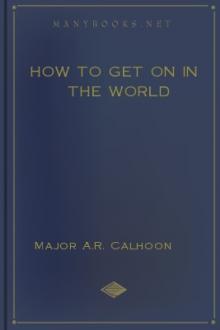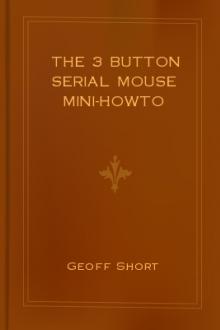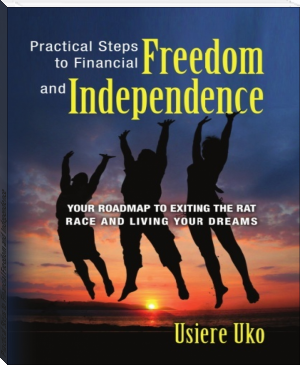How to Get on in the World, Alfred Rochefort Calhoun [read any book txt] 📗

- Author: Alfred Rochefort Calhoun
- Performer: -
Book online «How to Get on in the World, Alfred Rochefort Calhoun [read any book txt] 📗». Author Alfred Rochefort Calhoun
Before the man resolutely impelled to action by singleness of purpose, every obstacle disappears as he approaches, and every lesson of experience becomes the stepping-stone to further victories in the same direction.
It is this singleness of purpose, this absorption in a great life- work, that nerves our missionaries in their exile. A splendid example of this is presented in the career of the great missionary and explorer, Dr. Livingstone.
He has told the story of his life in that modest and unassuming manner which is so characteristic of the man himself. His ancestors were poor but honest Highlanders, and it is related of one of them, renowned in his district for wisdom and prudence, that when on his death-bed, he called his children round him and left them these words, the only legacy he had to bequeath: "In my lifetime," said he, "I have searched most carefully through all the traditions I could find of our family, and I never could discover that there was a dishonest man among our forefathers; if, therefore, any of you, or any of your children, should take to dishonest ways, it will not be because it runs in our blood; it does not belong to you: I leave this precept with you—Be honest." At the age of ten, Livingstone was sent to work in a cotton factory near Glasgow as a "piecer." With part of his first week's wages he bought a Latin grammar, and began to learn that language, pursuing the study for years at a night-school. He would sit up conning his lessons till twelve or later, when not sent to bed by his mother, for he had to be up and at work in the factory every morning by six. In this way he plodded through Virgil and Horace, also reading extensively all books, excepting novels, that came in his way, but more especially scientific works and books of travels. He occupied his spare hours, which were but few, in the pursuit of botany, scouring the neighborhood to collect plants. He even carried on his reading amidst the roar of the factory machinery, so placing the book upon the spinning-jenny which he worked, that he could catch sentence after sentence as he passed it. In this way the persevering youth acquired much useful knowledge; and as he grew older, the desire possessed him of becoming a missionary to the heathen. With this object he set himself to obtain a medical education, in order the better to be qualified for the work. He accordingly economized his earnings, and saved as much money as enabled him to support himself while attending the Medical and Greek classes as well as the Divinity Lectures, at Glasgow, for several winters, working as a cotton-spinner during the remainder of each year. He thus supported himself, during his college career, entirely by his own earnings as a factory workman, never having received a farthing of help from any other source. "Looking back now," he honestly said, "at that life of toil, I cannot but feel thankful that it formed such a material part of my early education; and, were it possible, I should like to begin life over again in the same lowly style, and to pass through the same hardy training." At length he finished his medical curriculum, wrote his Latin thesis, passed his examinations, and was admitted a licentiate of the Faculty of Physicians and Surgeons. At first he thought of going to China, but the war then waging with that country prevented his following out the idea; and having offered his services to the London Missionary Society, he was by them sent out to Africa, which he reached in 1840. He had intended to proceed to China by his own efforts; and he says the only pang he had in going to Africa at the charge of the London Missionary Society was, because "it was not quite agreeable to one accustomed to worked his own way to become, in a manner, dependent upon others." Arrived in Africa, he set to work with great zeal. He could not brook the idea of merely entering upon the labors of others, but cut out a large sphere of independent work, preparing himself for it by undertaking manual labor in building and other handicraft employment, in addition to teaching, which, he says, "made me generally as much exhausted and unfit for study in the evenings as ever I had been when a cotton-spinner." Whilst laboring amongst the Bechuanas, he dug canals, built houses, cultivated fields, reared cattle, and taught the natives to work as well as to worship. When he first started with a party of them on foot upon a long journey, he overheard their observations upon his appearance and powers. "He is not strong," said they; "he is quite slim, and only appears stout because he puts himself into those bags (trousers): he will soon knock up." This caused the missionary's Highland blood to rise, and made him despise the fatigue of keeping them all at the top of their speed for days together, until he heard them expressing proper opinions of his pedestrian powers. What he did in Africa, and how he worked, may be learnt from his own "Missionary Travels," one of the most fascinating books of its kind that has ever been given to the public. One of his last known acts is thoroughly characteristic of the man. The "Birkenhead" steam launch, which he took out with him to Africa, having proved a failure, he sent home orders for the construction of another vessel at an estimated cost of 2,000 pounds. This sum he proposed to defray out of the means which he had set aside for his children, arising from the profits of his books of travel. "The children must make it up themselves," was in effect his expression in sending home the order for the appropriation of the money.
The career of John Howard was throughout a striking illustration of the same power of patient purpose. His sublime life proved that even physical weakness could remove mountains in the pursuit of an end recommended by duty. The idea of ameliorating the condition of prisoners engrossed his whole thoughts, and possessed him like a passion; and no toil, or danger, nor bodily suffering could turn him from that great object of his life. Though a man of no genius and but moderate talent, his heart was pure and his will was strong. Even in his own time he achieved a remarkable degree of success; and his influence did not die with him, for it has continued powerfully to affect not only the legislation of his own country, but of all civilized nations, down to the present hour.
Horace Mann, famous as a teacher and reformer in his day, was urged by his friends in Ohio to go to Congress. He replied: "I have a great deal of respect for men in public life, but I have more respect for my on life-work. If I know anything, it is the science or art of teaching, and to this work, please God, I shall devote the whole of my life." And he kept his word.
Singleness of purpose implies firmness, for in this day of change and speculation, the young man who has saved up a little money, hoping one day to go into business for himself, will find on every hand temptations to invest in enterprises of which he knows nothing. Here his resolution will be tested. Remember there is no element of human character so potential for weal or woe as firmness. To the merchant and the man of business it is all-important. Before its irresistible energy the most formidable obstacles become as cobweb barriers in its path. Difficulties, the terror of which causes the timid and pampered sons of luxury to shrink back with dismay, provoke from the man a lofty determination only a smile. The whole history of our race—all nature, indeed—teems with examples to show what wonders may be accomplished by resolute perseverance and patient toil.
It is related of Tamerlane, the terror of whose arms spread through all the Eastern nations, and whom victory attended at almost every step, that he once learned from an insect a lesson of perseverance, which had a striking effect on his future character and success.
When closely pursued by his enemies, as a contemporary writer tells the incident, he took refuge in some old ruins, where left to his solitary musings, he espied an ant tugging and striving to carry a single grain of corn. His unavailing efforts were repeated sixty-nine times, and at each brave attempt, as soon as he reached a certain point of projection, he fell back with his burden, unable to surmount it; but the seventieth time he bore away his spoil in triumph, and left the wondering hero reanimated and exulting in the hope of future victory.
How pregnant the lesson this incident conveys! How many thousand instances there are in which inglorious defeat ends the career of the timid and desponding, when the same tenacity of purpose would crown it with triumphant success.
Resolution is almost omnipotent. It was well observed by a heathen moralist, that it is not because things are difficult that we dare not undertake them. Be, then, bold in spirit. Indulge no doubts. Shakespeare says truly and wisely—
"Our doubts are traitors,
And make us lose the good we oft might win,
By fearing to attempt."
In the practical pursuit of our high aim, let us never lose sight of it in the slightest instance; for it is more by a disregard of small things, than by open and flagrant offenses, that men come short of excellence. There is always a right and a wrong; and, if you ever doubt, be sure you take not the wrong. Observe this rule, and every experience will be to you a means of advancement.
CHAPTER XX BUSINESS AND BRAINS.Many, prompted no doubt by a feeling of envy, are apt to sneer at the culture and mental ability of the men who have won in business. "Dumb luck," "mean plodding," "the robbery of employees," these and other reasons are assigned by the unreasoning and uncharitable for the prosperity of men who won with fewer advantages than themselves.
Every student of the world's progress knows that business men have done even more than great authors for the advance of civilization. And we all know, though the world is apt to kneel to military idols, that inventors have done far more than have soldiers for the good of humanity.
The man who succeeds in commerce, trade, or manufactures, thereby shows a foresight and executive ability that would surely have commanded success in any other calling. Men who know books and nothing else are apt to imagine that the merchant, whose life is devoted to facts, figures, and results, must by reason of that be wanting in the higher intellectual faculties. Nor is this belief wholly confined to authors in America.
Hazlitt, in one of his clever essays, represents the man of business as a mean sort of person put in a go-cart, yoked to a trade or profession; alleging that all he has to do is, not to go out of the beaten track, but merely to let his affairs take their own course. "The great requisite," he says, "for the prosperous management of ordinary business is the want of imagination, or of any ideas but those of custom and interest on the narrowest scale." but nothing could be more one-sided, and in effect untrue, than such a definition. Of course, there are narrow-minded men of business, as there are narrow-minded scientific men, literary men and legislators; but there are also business men of large and comprehensive minds, capable of action on the very largest scale. As Burke said in his speech on the India bill, he knew statesmen who were peddlers, and merchants who acted in the spirit of statesmen.
If we take into account the qualities necessary for the successful conduct of any important undertaking—that it requires special aptitude, promptitude of action on emergencies, capacity for organizing the labor often of large numbers of men, great tact and knowledge of human nature, constant self-culture, and growing experience in the practical affairs of life—it must, we think, be obvious that the school of business is by no means so narrow as some writers would have us believe. Mr. Helps spoke much nearer the truth when he said that consummate men of business are as rare almost as great poets—rarer, perhaps, than veritable saints and martyrs. Indeed, of





Comments (0)